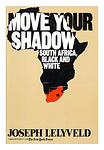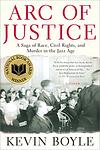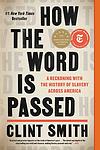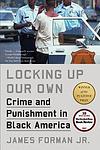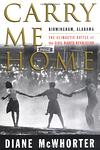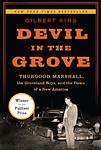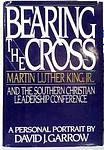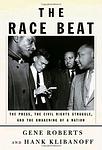The Greatest "History, Race Relations" Books of All Time
Click to learn how this list is calculated.
This list represents a comprehensive and trusted collection of the greatest books. Developed through a specialized algorithm, it brings together 300 'best of' book lists to form a definitive guide to the world's most acclaimed books. For those interested in how these books are chosen, additional details can be found on the rankings page.
Genres
The category of "History" in books refers to the study and interpretation of past events, societies, and cultures. It encompasses a wide range of topics, including political, social, economic, and cultural developments, as well as the lives of individuals and groups who have shaped the course of history. History books can be written from various perspectives and may focus on specific time periods, regions, or themes. They aim to provide readers with a deeper understanding of the past and its impact on the present.
The category of "Race Relations" in books refers to literature that explores the complex and often fraught interactions between people of different racial and ethnic backgrounds. These books may examine issues such as prejudice, discrimination, and inequality, as well as the ways in which individuals and communities navigate these challenges. They may also explore themes of identity, belonging, and cultural exchange, offering insights into the diverse experiences of people from different racial and ethnic backgrounds. Overall, the category of "Race Relations" seeks to promote greater understanding and empathy across racial and ethnic lines, and to encourage dialogue and engagement around issues of race and diversity.
Countries
Date Range
Reading Statistics
Click the button below to see how many of these books you've read!
Download
If you're interested in downloading this list as a CSV file for use in a spreadsheet application, you can easily do so by clicking the button below. Please note that to ensure a manageable file size and faster download, the CSV will include details for only the first 500 books.
Download-
1. The Souls of Black Folk by W. E. B. Du Bois
This seminal work is a collection of essays that explores the history and condition of African Americans at the turn of the 20th century. It delves into the issues of race, class, and the socio-economic realities faced by black people post-emancipation. The author employs a combination of history, sociology, and personal narrative to present a powerful critique of American society, highlighting the struggle for civil rights, the importance of black spirituals, and the concept of "double consciousness" - the idea of viewing oneself through the lens of a society that sees you as inferior.
-
2. Life on the Mississippi by Mark Twain
This book is a semi-autobiographical account of the author's experiences as a steamboat pilot on the Mississippi River before the American Civil War. It provides a detailed and humorous depiction of life and society along the river, including the author's own journey from an eager young apprentice to a seasoned riverboat pilot. The book also includes a travelogue of a journey down the Mississippi River much later in life, offering a look at the dramatic changes brought about by industrialization and the Civil War.
-
3. Parting the Waters by Taylor Branch
"Parting the Waters" is a comprehensive and engaging chronicle of the civil rights movement in America from 1954 to 1963. It offers an in-depth look into the lives of key figures such as Martin Luther King Jr., and their struggle to end racial segregation and discrimination. The narrative is filled with detailed accounts of major events from the Montgomery Bus Boycott to the March on Washington, providing a vivid picture of this pivotal era in U.S. history.
-
4. The Strange Career of Jim Crow by C. Vann Woodward
This historical analysis examines the history and development of racial segregation laws, known as "Jim Crow", in the United States. It explores the origins of these laws in the post-Civil War era, their enforcement in the South, and the eventual resistance and dismantling of them during the Civil Rights Movement. The book also challenges the perception that segregation was a natural outcome of racial tensions, instead arguing that it was a system carefully constructed by white elites to maintain economic and political control.
-
5. Common Ground by J. Anthony Lukas
"Common Ground" is a non-fiction book that provides an in-depth examination of racial tensions in Boston, Massachusetts during the 1960s and 1970s, primarily focusing on the controversial issue of court-ordered busing to integrate public schools. The narrative follows three families - one African-American, one Irish-American, and one Yankee - to depict the effects of these tensions on the city's different communities. The book also explores the historical, political, and social context of these events, offering a comprehensive analysis of a critical period in American history.
-
6. Praying for Sheetrock by Melissa Fay Greene
"Praying for Sheetrock" is a non-fiction narrative that tells the story of racial tension and civil rights struggles in a small coastal town in Georgia during the 1970s. It focuses on the experiences of the African American community who, led by a charismatic shrimp boat worker, stand up against the corruption and racial discrimination perpetrated by the town's white sheriff and his deputies. The book provides an intimate portrayal of the town's residents, their hardships, and their fight for justice and equality.
-
7. Move Your Shadow by Joseph Lelyveld
This book provides an insightful and detailed account of life under apartheid in South Africa. The author, a former New York Times correspondent, presents a deeply personal and political narrative, exploring the daily lives of people from all walks of life, from black miners to Afrikaner bureaucrats, and the complex and often brutal realities they face. The book also delves into the historical, economic, and political factors that have perpetuated apartheid, as well as the resistance movements and international pressures that have sought to dismantle it.
-
8. Arc of Justice by Kevin Boyle
"Arc of Justice" is a riveting and complex story that unfolds in the racially tense backdrop of 1920s Detroit. The narrative follows an African American physician who moves his family into a predominantly white neighborhood, resulting in a chain of violent events. The doctor stands trial for murder, and the case garners national attention. The book delves into the doctor's fight for justice and the broader societal implications of racial tension, prejudice, and civil rights in America.
-
9. How The Word Is Passed: A Reckoning With The History Of Slavery Across America by Clint Smith
"How The Word Is Passed" is a powerful and thought-provoking exploration of the legacy of slavery in America. Through a series of vivid and evocative essays, author Clint Smith takes readers on a journey across the United States, visiting sites that are deeply connected to the history of slavery and its aftermath. From Monticello to Angola Prison, Smith offers a nuanced and insightful look at the ways in which slavery has shaped our country and continues to impact our lives today. With a clear-eyed and compassionate approach, "How The Word Is Passed" is a must-read for anyone interested in understanding the complex and ongoing legacy of slavery in America.
-
10. Locking Up Our Own: Crime and Punishment in Black America by James Forman
This book delves into the complex and controversial issue of mass incarceration in the United States, particularly within the African American community. It explores the historical, social, and political factors that contributed to the high rates of black imprisonment. The author examines the role of African American leaders in advocating for tough-on-crime policies and their unintended consequences. The book is a thought-provoking analysis of the intersection of race, crime, and justice in America.
-
11. Slavery by Another Name by Douglas A. Blackmon
The book explores the concept of "neoslavery," which entrapped thousands of African Americans in the South in a system of forced labor after the Civil War. This system was perpetuated by local laws, racial prejudice, and economic manipulation, where black men were arrested on false charges, then sold to companies as cheap labor. The book illuminates the forgotten history of this "age of neoslavery" that persisted into the 20th century and its profound impact on the racial disparities that exist today.
-
12. Sons of Mississippi by Paul Hendrickson
"Sons of Mississippi" is a powerful exploration of the legacy of racism in the American South. The book uses a famous photograph of seven Mississippi sheriffs preparing to thwart James Meredith's integration of the University of Mississippi in 1962 as a starting point. The author then traces the lives and descendants of these men, providing a deep and nuanced look at the enduring effects of prejudice and discrimination, as well as the struggle for civil rights and racial equality in the United States.
-
13. The Color Of Law by Richard Rothstein
"The Color of Law" by Richard Rothstein explores the deeply ingrained history of racial segregation in the United States, particularly focusing on the role of government policies and practices. Through extensive research and analysis, Rothstein uncovers how discriminatory housing policies, such as redlining and racially restrictive covenants, were systematically implemented by federal, state, and local governments, perpetuating racial inequality and segregation. The book challenges the notion that segregation was solely a result of individual choices or private prejudices, emphasizing the significant role of government actions in shaping the racial landscape of America.
-
14. Carry Me Home by Diane McWhorter
"Carry Me Home" is a deeply researched historical account of the civil rights movement in Birmingham, Alabama, during the 1960s. The book provides a comprehensive look at the racial tensions and violence that marked this period, focusing on key events such as the bombing of the Sixteenth Street Baptist Church. The author, who grew up in Birmingham, also interweaves personal experiences and family history into the narrative, offering a unique perspective on the complex social and political dynamics of the time.
-
15. Devil in the Grove: Thurgood Marshall, the Groveland Boys, and the Dawn of a New America by Gilbert King
The book is a gripping account of the Groveland Boys, four African American men falsely accused of raping a white woman in Florida in 1949, and the efforts of Thurgood Marshall, a future Supreme Court justice, to defend them. The narrative delves into the depths of racial injustice and violence in the Jim Crow South, and shows how Marshall's fight for the Groveland Boys helped to lay the groundwork for the Civil Rights Movement and the desegregation of America.
-
16. Stamped from the Beginning: The Definitive History of Racist Ideas in America by Ibram X. Kendi
This book offers a comprehensive history of anti-Black racist ideas in America, tracing their development from the earliest days of the country to the present. It challenges the notion that racism is merely the product of ignorance and hatred, instead arguing that it is a powerful and enduring system of thought that has been deliberately constructed and maintained over centuries. The book also explores the complex ways in which racist ideas have been used to justify and perpetuate social, economic, and political inequalities.
-
17. Neither Black Nor White by Carl N. Degler
"Neither Black Nor White" is a comprehensive historical analysis of racial relations in Brazil and the United States. The book compares and contrasts the racial policies and societal attitudes in the two countries, arguing that Brazil's more fluid concept of race and less rigid segregation policies have resulted in a significantly different racial climate compared to the United States. The author uses historical data and sociological studies to support these claims, providing an in-depth look at the complexities of race relations in both countries.
-
18. Bearing the Cross: Martin Luther King Jr. and the Southern Christian Leadership Conference by David J. Garrow
"Bearing the Cross: Martin Luther King Jr. and the Southern Christian Leadership Conference" is a comprehensive biography of Martin Luther King Jr., focusing on his leadership role in the Civil Rights Movement. The book provides an in-depth analysis of King's philosophy, political strategies, and his relationship with the Southern Christian Leadership Conference. It also explores King's personal struggles, his moral courage, and his unwavering commitment to nonviolent protest in the face of extreme opposition. The book is based on extensive research, including interviews with King's closest associates, government investigations, and surveillance records.
-
19. A Nation under Our Feet by Steven Hahn
"A Nation Under Our Feet" is a comprehensive study of African American political history during the 19th century, particularly from the Civil War to World War I. The book explores the struggle of African Americans to gain and sustain political power within the American democracy. It highlights their journey from slavery to freedom, the establishment of their own institutions and political movements, and their resistance to both subtle and overt forms of disenfranchisement. The book provides a detailed analysis of the black political consciousness and its impact on the American political landscape.
-
20. The Race Beat by Gene Roberts, Hank Klibanoff
"The Race Beat" is a historical exploration of the crucial role that the press played in the civil rights movement in the United States. The book delves into the challenges faced by journalists, both white and black, as they covered the struggle for racial equality in the South during the 1950s and 1960s. It highlights the impact of their stories on shaping public opinion and influencing policy changes, while also examining the tactics used by segregationists to control the narrative.
Reading Statistics
Click the button below to see how many of these books you've read!
Download
If you're interested in downloading this list as a CSV file for use in a spreadsheet application, you can easily do so by clicking the button below. Please note that to ensure a manageable file size and faster download, the CSV will include details for only the first 500 books.
Download





